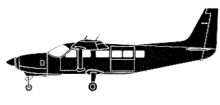Incident Overview

Description
A Cessna 208B Grand Caravan survey aircraft was destroyed when it impacted mountainous terrain near Yumbillo in Colombia. All three occupants were killed. The aircraft, fitted with LIDAR equipment, operated on a VFR survey flight out of Cali. It took off at 11:39 hours and made a climbing turn to the left. Seven minutes after takeoff the aircraft impacted a wooded mountainside, coming to rest at an elevation of 6773 feet. The accident terrain shows a 60ø up slope and thick vegetation. Weather conditions included low clouds. Probable cause: (translated from Spanish report) Execution of a VFR flight in reduced visibility weather conditions. Poor decision making by the crew in continuing VFR operation as they were in an environment of significantly reduced visibility. Inadequate operational risk assessment due to the lack of familiarity of the foreign crew with the topography and meteorological evolution of the sector.
Primary Cause
Crew decision to continue VFR operation in reduced visibility weather conditions and inadequate operational risk assessment.Crew decision to continue VFR operation in reduced visibility weather conditions and inadequate operational risk assessment.Share on:




